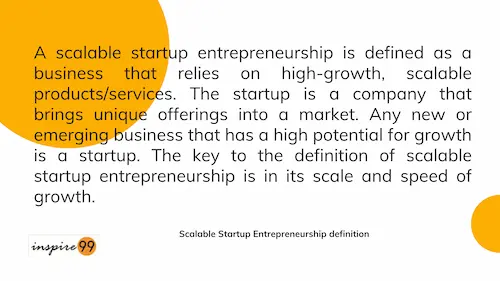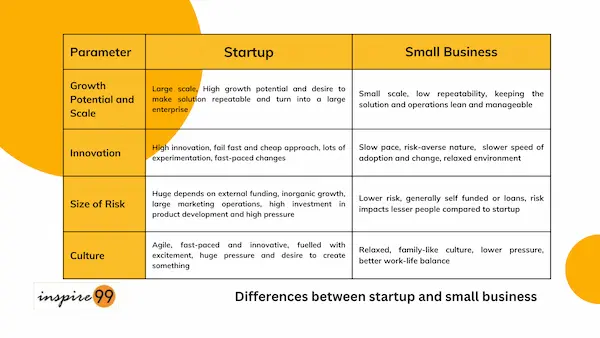What is a startup: This article answers the most common questions about a startup. This is an exciting world with risks, innovation, investment and sometimes even a magical outcome. In this article, we will talk about the meaning of a startup, differences between a startup and a small business. Most times, startup and small businesses are used interchangeably. However, there’s a key difference between the two which we will discuss in this article. Depending on the type of business, you can establish the corresponding type of entrepreneurship as a founder.
What is a startup?
An entrepreneur is a person who takes a risk. This can be someone running an established business or creating something from scratch. A startup however is a company that takes risks and brings something new into the market. This can be a new service, product or a business model that will create value and commercial benefit. Technically a startup is defined as a business that depends on high growth.
Apart from bringing something new into the market, a startup is defined as a business with explosive growth potential. This makes a startup attractive to investors because they aim to receive large returns on their investment. The scale and growth speed are two characteristics defining a startup.

Why is a startup created?
In answering the question – what is a startup, you need to identify your business purpose. A business has to to add value to a user. This can either ease pain or provide pleasure.
A startup can offer either of the services just like any other business. Its value lies in the uniqueness of service/product. Most popular examples of such businesses are uber, Air BnB, Facebook etc which have revolutionised our lives to a certain extent.
In short, a startup intends to find a way to solve a problem or elevate user experience. If your intention is to make money, startup is not the best route. There are easier options including investment banking, stock markets and even small businesses. A startup’s main purpose is value addition. The financial benefits or modes of operation create a path for its sustenance or growth.
What is a small business?
A small business is different from a startup. This is usually a private company with fewer employees and scale compared to a large business. A small business can be characterised by revenue, number of employees, scale of reach etc. For a small business, its reach and impact is lesser with smaller growth potential. Most small businesses are usually driven by self investment. They don’t grow as fast as a startup business. Most of these small businesses are usually run by traders, partnerships or families. They don’t grow as quickly or widely as a startup.
Small businesses are pivotal for job creation and the economy in general. For most, the small business provides flexibility for time and work. Growth in a small business does not have the same pressure as in a startup. A small business for a founder can be a great way to find their own pace for what they care about. Generally, small businesses have the following characteristics.
Difference between startup and small business
What are the differences between a startup and a small business? Technically they are used interchangeably in most conversations. However, there are some small differences between a startup and a small business that distinguish them. These differences help us identify whether we want to create a startup or a small business.

Both models have a lot to offer and can be fulfilled based on your goals. A startup tends to fuel the high desire for growth and scalability. Whereas a small business is more focused on a smaller scale and relatively better work-life balance. Their differences are categorised into 4 different themes as below.
Growth Potential and Scale
Startups pride themselves in their ability to scale, expand and grow. Most entrepreneurs dream of creating a unicorn that can disrupt the market and create the next big thing. This is one of the biggest differences between a small business and a startup. Such startups generally go through multiple fundraisers to fuel growth and capture the market. These startups generally wait to create a product market fit after which the focus will be on massive expansion.
Small businesses however are either self-funded or rely on loans and organic growth to enhance their revenue. The focus however is not on a similar scale as a startup.
Innovation
Startups create new and innovative products or services in the market. They try to change the way either a business or an individual operates. Some of the best examples of startups that have changed the current-day world are Uber, Air BnB, google etc. They all had an innovation to back their approach.
This innovation was sometimes technology whereas in other cases it was about the type of service or the way a market operates. Technology helped these businesses to scale and grow large. Small businesses on the other hand focus on providing established products or solutions in an existing market.
Size of Risk
Startups are all about risks, fail fast and fail cheap approaches. These entrepreneurs focus on creating products or solutions at speed to test the market’s readiness. Most of these are high-risk ventures. As you might already be aware, more than 90% of startups fail. And there are plenty of reasons for this failure.
But they all often work at such a pace that the risk factor is large. In small businesses, you have time to experiment and take time to see the results. With a startup, however, you don’t have that luxury of time. (Ref: https://www.forbes.com/sites/neilpatel/2015/01/16/90-of-startups-will-fail-heres-what-you-need-to-know-about-the-10/?sh=74e44bc76679 )
Culture
Startup cultures are unique, exciting and quick. I can’t impress the words agility and quick enough. Small businesses tend to have a relaxed pace of approach. You can manage pressures better in a small business compared to a startup. Startups love the idea of risks, creativity, innovation and continuous experimentation.
Small businesses have a family-like culture, there’s more time and opportunity to create a slower pace of business. With startups, however, you don’t have that flexibility.

Characteristics and qualities of small Business
A small business can be identified by the number of employees and its revenue or turnover. Some of the common characteristics in a small business are:
- < 500 employees
- < $7.5 million in average revenue and receipts
- It may not have the intention to grow
This table below talks about different types of businesses organised by by size.
| AUS | US | CAN | EU | |
|---|---|---|---|---|
| Minute/micro | 1-2 | 1-6 | 1-4 | <10 |
| Small | <15 | <250 | 1-99 | <50 |
| Medium | <200 | <500 | 100-499 | <250 |
| Large | <500 | <1000 | >500 | <1000 |
| Enterprise | >500 | >1000 | N/A | >1000 |
References:

Pingback: 4 Key Differences between Entrepreneur and Entrepreneurship - Inspire99
Pingback: Entrepreneurial Operating System Framework for startup - Inspire99
Pingback: 3 Main Differences Entrepreneur vs Manager - Inspire99
Pingback: 3 Key Characteristics of Fabian Entrepreneurs - Inspire99
Pingback: 5 Scalable startup entrepreneurship characteristics - Inspire99
Pingback: How to Become a Startup Entrepreneur? - Inspire99
Pingback: 5 Reasons Why SEO is Perfect for Your Bootstrapped Start-Up - Inspire99
Pingback: What is a Small business entrepreneurship? - Inspire99
Pingback: A quick guide to understanding Broadband itself. - Inspire99
Pingback: Should your start go for Horizontal Vs Vertical Market? - Inspire99
Pingback: Startup Analysis, The co-operative approach - Happy Roots - Inspire99
Pingback: Startup Vision, Mission and Goal Setting for a Founder - Inspire99
Pingback: You don't need to be the biggest brand in the world - Inspire99
Pingback: The critical ingredient in a startup is getting off your butt! - Inspire99
Pingback: 5 strategic steps for your startup branding - Inspire99
Pingback: 5 Stages of Startup from idea to Exit for an Entrepreneur - Inspire99
Pingback: The Startup Hockey Curve for Exponential Growth - Inspire99
Pingback: Fundraising - How to raise funds for a business startup? - Inspire99
Pingback: 4 Methods, How to build a startup with no money? - Inspire99
Pingback: 3 Types of Exit Strategy for a startup founder - Inspire99
Pingback: 3 Strategic Tips for Early-Stage Startup hiring - Inspire99
Pingback: Don’t try to do everything by yourself in a startup - Inspire99
Pingback: 4 Factors in your Financial Projections in a startup - Inspire99
Pingback: Unique selling point definition in Startup, Small Business - Inspire99
Pingback: 4 Steps to turn your idea into business - Inspire99
Pingback: You have to get good at ceding control in a Startup! - Inspire99
Pingback: You've got to ignore the hype of startups and Focus - Inspire99
Pingback: Anchor customer for MVP in Product Development - Inspire99
Pingback: No matter how many customers you have, each is an individual! - Inspire99
Pingback: Google Slides for presentations - Startup 101 - Inspire99
Pingback: Four Types of Entrepreneurship for a Founder - Inspire99
Pingback: Step by Step Guide to Launch Your Own Startup - Inspire99
Pingback: Business Model and Product will follow if you have the right people - Inspire99
Pingback: Why do you need to have an entrepreneurial mindset? - Inspire99
Pingback: Why work for a startup - Inspire99
Pingback: 6 Must-Have areas in business plan for startup - Inspire99
Pingback: Wordle sold for 7 figures - Startup Theories? - Inspire99
Pingback: National Startup Day, The backbone of New India and Golden Age - Inspire99
Pingback: 3 Key points on How to get funding for startup - Inspire99
Pingback: 5 Key Reasons for founders - Why do startups fail? - Inspire99
Pingback: 4 Practical Tips - Pricing Strategy for Startup - Inspire99
Pingback: The word Entrepreneur is derived from Entreprende - Meaning - Inspire 99
Pingback: What is the meaning of entrepreneur, functions and characteristics - Inspire 99
Pingback: Entrepreneurship is an opportunity to create wealth - Inspire 99
Pingback: 5 Key Areas of difference between entrepreneur and businessman - Inspire 99
Pingback: 4 Types of Entrepreneurs: Key Distinctions for Startup Founder - Inspire 99
Pingback: Scalable startup entrepreneurship definition - Inspire 99
Pingback: Top 8 Characteristics of an Entrepreneur to Build a Startup - Inspire 99
Pingback: How to know if your business idea is good and worth pursuing? - Inspire 99